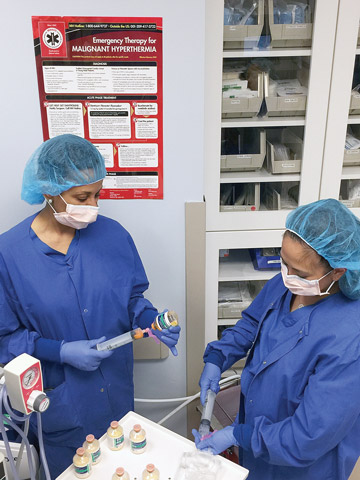My mom was having an anesthesia evaluation for a vein stripping procedure, and one of the routine questions was whether anyone in the family ever had a problem with anesthesia. Upon learning about my brother, the anesthesiologist said, "Wow,
that sounds like this thing called malignant hyperthermia that we didn't really know about back then." While we still didn't know for sure if it was MH that took Will, the OR team took the appropriate MH precautions during my mother's
surgery.
Flash forward to the early 2000s. I was in medical school and then residency, on my way to becoming an orthopedic surgeon. Obviously, I had a lot on my mind, like any young doctor-in-training. But when MH came up during lectures, I was unusually
attentive.
Now, I'd never been tested for MH, because the diagnostic test is a muscle biopsy — a fairly large piece of muscle, about as big around and a little bit longer than your thumb, taken out of your lateral thigh. In the OR, however, I absolutely
operated under the assumption that, because of what happened to Will, I was possibly MH-susceptible. I always make sure to tell the anesthesia personnel I'm working with that I could possibly have a genetic mutation that causes MH. That
way, they'd know what was happening in case I ever lost conciousness while performing surgery due to vented gases that could trigger an MH event. Fortunately, nothing like that ever happened. In fact, I've yet to experience an MH crisis
in the OR — with myself or with a patient — and I hope I never do.
The day of reckoning — the day I had to know, for sure, if I was susceptible to MH — finally arrived in 2010, during a scary time in my growing family's life.
My wife was experiencing a complicated pregnancy with our third child, and we were pretty certain our newborn boy was going to need surgery. Knowing the MH mutation is genetic, I had no choice but to undergo the muscle biopsy in hope that
we wouldn't need to worry about MH for my son. It's a good thing I did, too. We found out conclusively that I do have a mutation that causes MH, and so my children have a 50% chance of susceptibility, too.
My hope is that we can screen all patients for MH with a blood test before surgery.
It was actually satisfying on some level to get that diagnosis, because in addition to protecting my son from harm, my parents learned definitively what had happened to my brother 44 years before. It gave them closure. They finally knew.
I also thought of the doctors who were helpless to save Will. How heartbreaking must it have been to come out of the OR and tell somebody their child died — and not be able to tell them why. I was encouraged that we'd come so far since
then in our understanding of MH.
.svg?sfvrsn=be606e78_3)

.svg?sfvrsn=56b2f850_5)